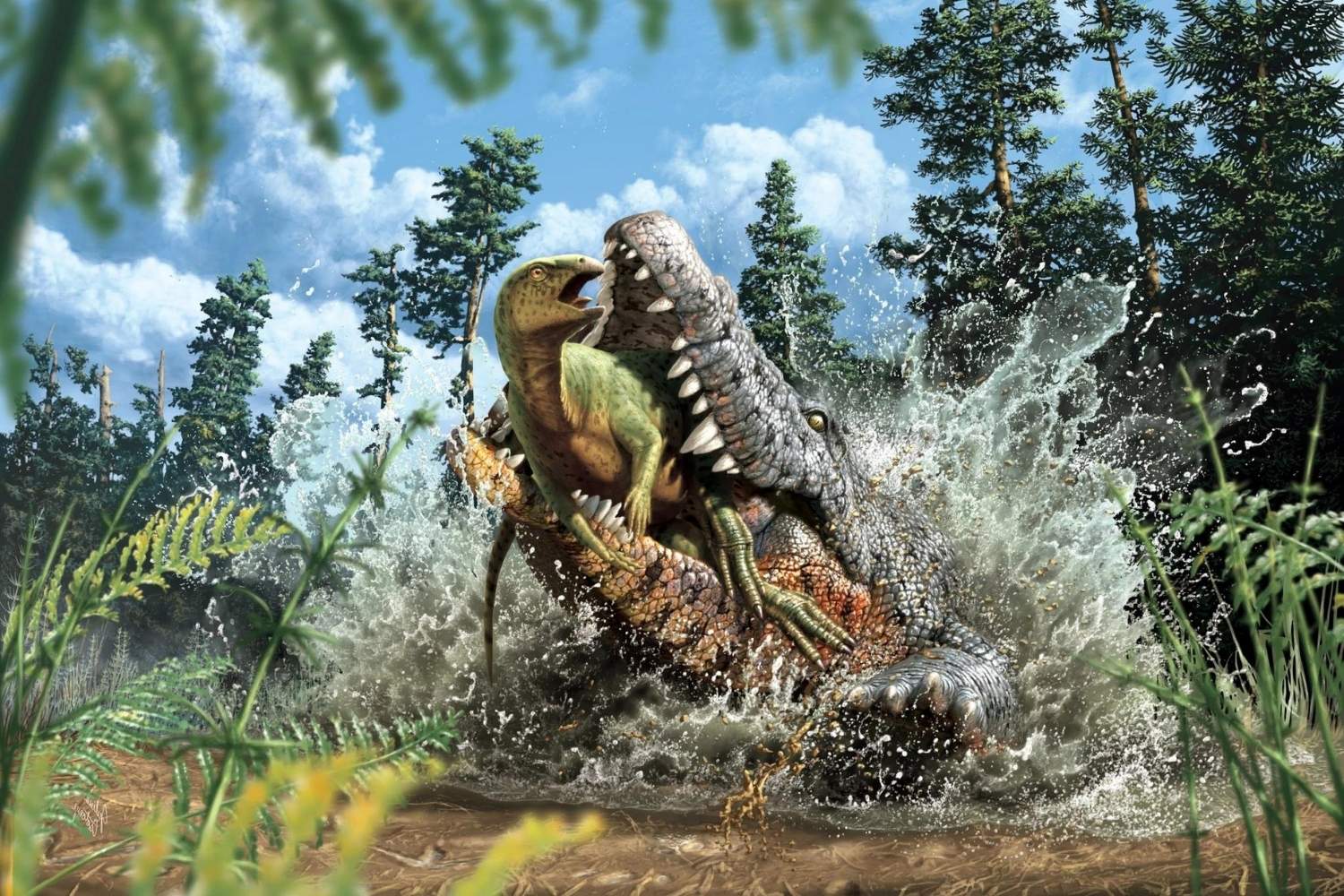
Confractosuchus sauroktonos is a fascinating prehistoric creature that roamed the Earth millions of years ago. This ancient crocodile-like reptile has captured the imagination of paleontologists and dinosaur enthusiasts alike. Did you know that Confractosuchus sauroktonos translates to "broken crocodile killer"? This name hints at its fearsome nature and predatory habits. Fossils of this creature have provided valuable insights into its lifestyle, diet, and environment. What makes Confractosuchus sauroktonos unique is its ability to prey on dinosaurs, making it a top predator of its time. Join us as we delve into 35 intriguing facts about this remarkable reptile, shedding light on its anatomy, behavior, and the world it inhabited.
Key Takeaways:
- Confractosuchus Sauroktonos was a 2.5-meter-long crocodile-like reptile that lived 95 million years ago in Australia. It hunted small dinosaurs and lived in warm, humid riverine environments.
- The discovery of Confractosuchus Sauroktonos sheds light on ancient predator-prey interactions, dietary habits, and the evolution of crocodile-like reptiles. Ongoing research continues to uncover more about its behavior and lifestyle.
What is Confractosuchus Sauroktonos?
Confractosuchus Sauroktonos is a fascinating prehistoric creature that roamed the Earth millions of years ago. This ancient crocodile-like reptile has intrigued scientists and dinosaur enthusiasts alike. Let's dive into some captivating facts about this ancient predator.
Origins and Discovery
Understanding where and how Confractosuchus Sauroktonos was discovered can shed light on its significance in paleontology.
- Confractosuchus Sauroktonos was discovered in Australia.
- The name Confractosuchus Sauroktonos means "broken crocodile lizard killer."
- It was first described in a scientific paper in 2022.
- The fossil was found in the Winton Formation, a well-known fossil site.
- Confractosuchus Sauroktonos lived during the Cretaceous period, around 95 million years ago.
Physical Characteristics
This ancient reptile had some unique physical traits that set it apart from other prehistoric creatures.
- Confractosuchus Sauroktonos was a medium-sized crocodile.
- It measured approximately 2.5 meters in length.
- The creature had a robust and muscular body.
- Its skull was broad and flat, typical of crocodile-like reptiles.
- The teeth were sharp and conical, perfect for gripping prey.
Diet and Hunting
Exploring the diet and hunting habits of Confractosuchus Sauroktonos reveals its role in the ancient ecosystem.
- Confractosuchus Sauroktonos was a carnivore.
- It primarily fed on small dinosaurs and other vertebrates.
- Evidence suggests it was an opportunistic feeder, eating whatever prey was available.
- The fossilized remains of a juvenile ornithopod dinosaur were found in its stomach.
- This discovery indicates that Confractosuchus Sauroktonos actively hunted dinosaurs.
Habitat and Environment
The environment in which Confractosuchus Sauroktonos lived provides insight into its lifestyle and behavior.
- Confractosuchus Sauroktonos inhabited riverine environments.
- These areas were characterized by lush vegetation and abundant water sources.
- The climate during the Cretaceous period was warm and humid.
- This reptile likely spent much of its time in water, similar to modern crocodiles.
- The presence of other predators in the area suggests a competitive ecosystem.
Significance in Paleontology
The discovery of Confractosuchus Sauroktonos has had a significant impact on our understanding of prehistoric life.
- The fossil provides evidence of predator-prey interactions during the Cretaceous period.
- It helps scientists understand the dietary habits of ancient crocodile-like reptiles.
- The discovery highlights the diversity of prehistoric ecosystems.
- It offers insights into the evolution of crocodiles and their relatives.
- The fossil's preservation allows for detailed study of ancient anatomy.
Interesting Tidbits
Here are some additional intriguing facts about Confractosuchus Sauroktonos that you might find fascinating.
- The name "Confractosuchus" refers to the broken state of the fossil when it was found.
- "Sauroktonos" translates to "lizard killer," reflecting its predatory nature.
- The fossil was discovered by a team of Australian paleontologists.
- It took several years of careful excavation to unearth the complete fossil.
- The discovery was made possible through collaboration between scientists and local landowners.
Legacy and Future Research
The study of Confractosuchus Sauroktonos continues to inspire future research and discoveries.
- Ongoing research aims to uncover more about its behavior and lifestyle.
- Scientists are using advanced techniques like CT scanning to study the fossil in detail.
- The discovery has sparked interest in further exploration of the Winton Formation.
- Confractosuchus Sauroktonos has become a popular subject in paleontological studies.
- Its discovery underscores the importance of fossil preservation and excavation.
Final Thoughts on Confractosuchus Sauroktonos
Confractosuchus Sauroktonos, a fascinating prehistoric predator, offers a glimpse into the ancient world. This crocodyliform, known for its unique features, lived during the Cretaceous period. Its discovery has provided valuable insights into the ecosystem and behavior of ancient reptiles. With its powerful jaws and robust body, Confractosuchus was a formidable hunter, preying on dinosaurs and other creatures.
The fossil evidence, including its stomach contents, reveals its diet and hunting strategies. This predator's existence highlights the diversity of life forms that once roamed our planet. Studying Confractosuchus helps paleontologists understand the evolutionary history of crocodyliforms and their role in prehistoric ecosystems.
In summary, Confractosuchus Sauroktonos is a remarkable species that enriches our knowledge of ancient life. Its discovery continues to captivate scientists and enthusiasts alike, shedding light on the complex web of life that existed millions of years ago.
Frequently Asked Questions
Was this page helpful?
Our commitment to delivering trustworthy and engaging content is at the heart of what we do. Each fact on our site is contributed by real users like you, bringing a wealth of diverse insights and information. To ensure the highest standards of accuracy and reliability, our dedicated editors meticulously review each submission. This process guarantees that the facts we share are not only fascinating but also credible. Trust in our commitment to quality and authenticity as you explore and learn with us.
